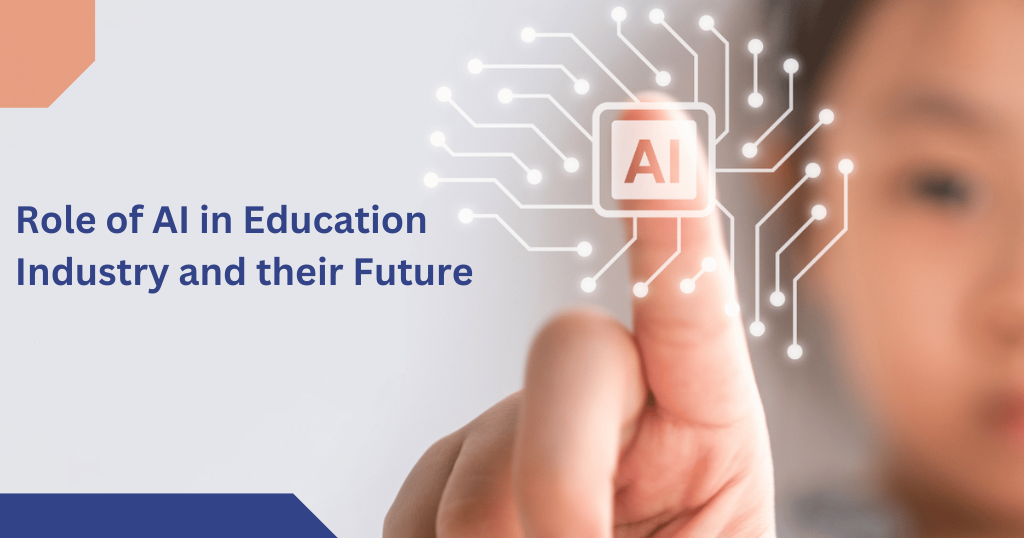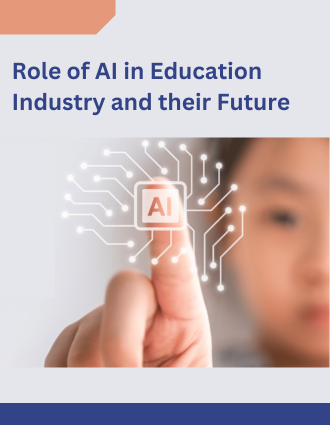The education sector is undoubtedly not an exception to the ways in which artificial intelligence (AI) has revolutionized numerous sectors. The integration of AI in education is revolutionizing the traditional approach to education. AI serves a multitude of benefits for students, teachers, and educational institutions such as automating administrative tasks and providing real-time feedback. The potential of ERP for educational institutions is paving the way for a future of education that is truly transformative. Today we will take a closer look at the role of artificial intelligence in the education sector in the future. Let’s dig deep!
What is AI in Education and its Impact?

Artificial intelligence in education can change this educational system by helping machines learn and make decisions on their own. It’s making a big impact by automating tasks, improving teaching, and personalizing learning.
AI is great at automating tasks that take up a lot of time for teachers. Things like grading, attendance, and registration can be done faster with AI. This gives teachers more time to create exciting lessons and interact with students.
The best ERP for schools and educational institutions is also great at giving students personalized learning experiences. It looks at lots of data to figure out what students like and what they’re good at. Then it suggests learning materials and activities that fit each student’s needs. Personalized learning helps students get more interested and motivated, and they do better in school.
AI also helps teachers do a better job. It looks at teaching data and gives teachers useful tips to improve their teaching methods. AI can even find mistakes in students’ work and give feedback on how to get better. This helps students learn and improve their skills. It can also change how teachers give lessons, adapt to what students need, and include everyone. AI in education tutors and helpers can give personalized help so that no student is left out.
But it is important to be careful when using AI in education. We need to think about ethics, privacy, and having people oversee AI. AI should help people, not replace them. Teachers are still really important in helping students think, feel, and grow. Higher education ERP systems are a powerful tool that can help teachers do even more.
Role of Artificial Intelligence (AI) in Education
The use of AI in education is growing on a daily basis, from chatbots to automation, and there will likely be even more applications coming up in the future. Some of the most common use cases are written below. Let’s take a look at them!
1. Unleashing the Power of AI in Remote Proctoring
One of the major challenges faced in online education is upholding academic integrity during assessments. To address this concern, AI-powered remote proctoring systems have emerged as an effective solution. These systems employ sophisticated algorithms and machine learning techniques to closely monitor students during exams.
By analyzing patterns and behaviours, education ERP software is able to identify suspicious activities such as cheating, unauthorized materials, or unusual eye movements.
This capability enables AI to flag potential academic misconduct, alerting instructors for further investigation. By ensuring a fair assessment process in online education, the role of AI-powered remote proctoring systems fosters trust and upholds the principles of academic integrity.
2. Personalized Learning Through AI Recommendations
Every student possesses unique learning preferences and requirements. Leveraging the power of AI, vast amounts of data, including student performance, interests, and learning styles, can be analyzed to provide personalized recommendations.
By comprehending individual strengths and weaknesses, AI algorithms can suggest specific learning materials, resources, and activities tailored to each student’s needs.
This personalized approach empowers students to learn at their own pace, concentrate on areas that require improvement, and explore topics of interest. Moreover, the best ERP for educational institutions can dynamically adapt the learning experience in real-time, making education more engaging and effective.
3. The Rise of AI-Powered Chatbots in Education
AI-powered chatbots are revolutionizing the way students seek information and support. These virtual assistants offer instant responses to queries, providing guidance and addressing common concerns.
Equipped with natural language processing capabilities, chatbots can understand and interpret student questions, delivering accurate and relevant answers.
They can assist with course enrollment, provide study tips, and even engage in interactive conversations. By saving time for both students and teachers, chatbots ensure that students receive prompt assistance, even outside regular working hours.
4. Enhancing Exam Fairness with AI
The application of AI has the potential to help educational institutions conduct fair exams by reducing biases and enhancing transparency. Automated grading systems powered by AI algorithms can accurately and consistently assess objective questions and assignments. This eliminates human subjectivity, ensuring that all students are evaluated fairly based on their performance.
An ERP software for educational institutes can also identify grading patterns to detect potential biases, fostering the creation of an inclusive learning environment. By alleviating the burden of manual grading, AI allows educators to focus more on providing valuable feedback and personalized guidance to students.
5. Education Without Boundaries Thanks to AI
The role of AI has the power to dismantle geographical barriers in education. With the aid of AI-powered tools, students can access educational content and resources from any corner of the globe. Language translation services, for instance, can facilitate learning for students who speak different languages.
Virtual reality (VR) and augmented reality (AR) technologies, driven by AI, can create immersive learning experiences, enabling students to explore historical sites, conduct virtual experiments, and interact with simulations. These technologies open up new avenues for remote learning, ensuring access to quality education irrespective of physical location.
Wrapping Up
The role of AI in shaping the future of the education industry is vast and full of promise. From personalized learning experiences to fair assessments and global accessibility, AI is reshaping the way education is delivered and received.
However, it is crucial to ensure ethical considerations and strike a balance between AI-driven solutions and human interactions in education. By responsibly embracing ERP for educational institutions, the learning processes can be enhanced, and students are equipped with the skills needed to thrive in the future.
Proctur’s comprehensive ERP system includes a plethora of features that aid in digital transformation and automation for a variety of institutions.



